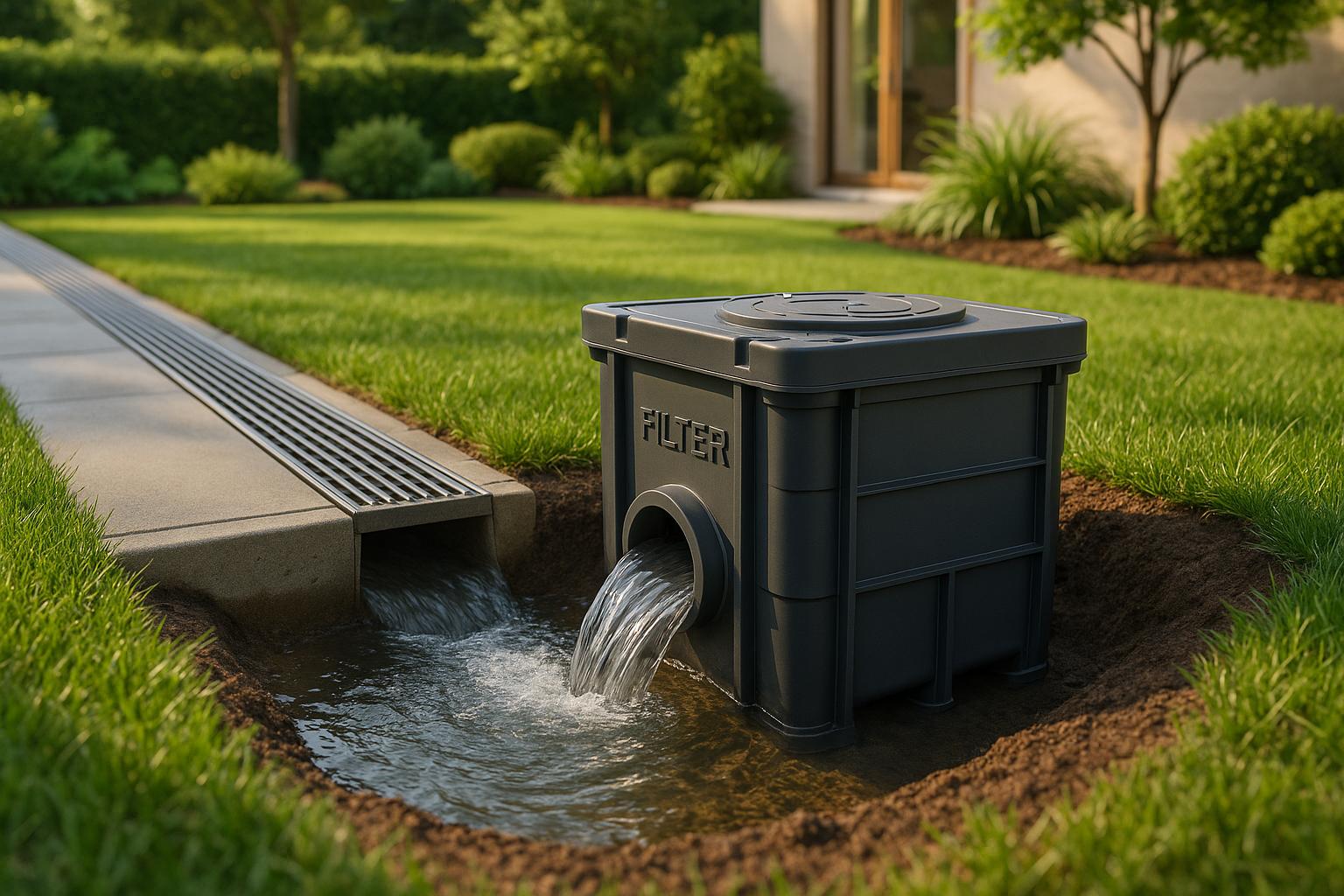- bhavya gada
- No Comments
Modular filtration units are a modern solution for managing stormwater runoff while improving water quality and preventing property damage. Unlike traditional drainage systems, these units filter out pollutants, control water flow, and reduce flooding risks. They are especially useful in areas like Maryland, where heavy rainfall and strict stormwater regulations demand efficient and compliant drainage systems.
Key Benefits of Modular Filtration Units:
- Pollutant Removal: Filters out over 90% of contaminants like oil, sediment, and heavy metals.
- Space-Saving Design: Requires up to 90% less surface area compared to older methods.
- Flood Control: Gradually releases stored water to prevent surges and flooding.
- Regulatory Compliance: Helps meet stormwater management standards, such as LEED certification.
- Flexible Installation: Can be placed under driveways, parking lots, or landscaped areas.
These systems are ideal for both residential and commercial properties, offering long-term cost savings, better drainage, and reduced environmental impact. Maryland communities, from Columbia to Silver Spring, are increasingly adopting modular filtration units to tackle flooding, protect property, and maintain local water quality.
How the Stormwater Management StormFilter Works
What Are Modular Filtration Units
Modular filtration units are underground systems designed to capture, filter, and manage stormwater runoff. Unlike traditional drainage systems that simply redirect water, these units actively treat it through multiple filtration stages before releasing it back into the environment. They are constructed using interlocking polypropylene modules, offering flexibility to meet specific drainage needs.
Here’s how they work: First, large debris is trapped. Next, biofiltration media – made up of engineered soil, plant roots, and microbes – removes contaminants from the water. The treated water is then stored in modular tanks, which slowly release it to prevent flooding or to support irrigation. Some advanced systems even include UV disinfection for an extra layer of water quality improvement. To ensure durability and functionality, the entire system is wrapped in geotextile fabric or waterproof membranes.
How Modular Units Differ from Standard Drainage Methods
Standard drainage methods, like French drains and catch basins, are primarily designed to move water away from an area. Modular filtration units, on the other hand, go a step further by treating and cleaning the water. For example, these systems can handle water flow rates of over 100 inches per hour while removing more than 90% of pollutants. They’re also far more space-efficient, often requiring up to 90% less surface area compared to traditional bioretention systems. This makes them ideal for urban environments or areas with limited space, as they can be installed under parking lots, driveways, or landscaped areas with minimal disruption.
| Feature | Modular Filtration Units | Standard Drainage Methods |
|---|---|---|
| Primary Function | Filters and treats water | Redirects or collects water |
| Pollutant Removal | Removes >90% of contaminants | Minimal or no treatment |
| Space Requirements | Up to 90% smaller footprint | Requires larger surface area |
| Maintenance | Individual modules are serviceable | Full system access often needed |
| Regulatory Compliance | Meets green certifications (e.g., LEED, SuDS) | May not meet modern water quality standards |
Uses for Residential and Commercial Properties
Thanks to their scalable design, modular filtration units are suitable for a wide variety of applications. In residential areas, they can be customized to manage runoff from roofs, driveways, and landscaped spaces while maintaining the property’s aesthetic appeal. Storage capacities can range from 1,000 liters to over 100,000 liters, depending on the system size. Homeowners in Maryland areas like Columbia and Silver Spring have adopted these systems to comply with stormwater regulations and improve drainage efficiency.
For commercial properties, their compact design is a major advantage. These systems can be installed under parking lots, shopping centers, office buildings, or industrial facilities, managing large volumes of stormwater from expansive impervious surfaces while maximizing usable land. They also integrate well with green infrastructure elements like permeable pavers and green roofs, helping businesses work toward LEED certification. In tight urban spaces, modular units have been installed in narrow street medians and compact landscaped areas, treating significant amounts of stormwater without taking up valuable real estate.
In environmentally sensitive regions, these systems are especially critical. They help prevent polluted runoff from reaching waterways such as streams, rivers, and the Chesapeake Bay. For Maryland property owners, where water quality regulations are strict, modular filtration units offer a practical and effective solution for managing stormwater while protecting natural resources. This versatility and efficiency highlight why these systems are becoming a preferred choice for modern drainage needs.
How Modular Filtration Units Improve Property Drainage
Modular filtration units are becoming an essential part of modern drainage systems for Maryland property owners. These systems go beyond traditional methods by addressing water quality, preventing floods, and protecting the environment. They work by purifying stormwater and carefully regulating its flow, ensuring both immediate and long-term benefits.
Removing Pollutants and Improving Water Quality
One of the standout features of modular filtration units is their ability to tackle pollutants that standard systems often miss. Using a multi-stage filtration process, these units handle everything from large debris to microscopic contaminants.
The initial stage typically involves sediment filters and vortex silt traps, which catch larger particles like dirt, leaves, and trash. This step not only prevents clogs but also improves overall water quality. Beyond this, specialized filtration media target specific pollutants, such as nitrogen and phosphorus from fertilizers, hydrocarbons and oils from paved surfaces, and heavy metals from building exteriors.
A great example of this technology in action is the FocalPoint Biofiltration System. It’s been rigorously tested and certified to meet strict water quality standards. Impressively, it can manage water flow at rates exceeding 100 inches per hour – well above the rainfall levels seen in most U.S. regions[4].
But water purification is only part of the story. These units also excel at controlling water flow to prevent flooding.
Preventing Floods and Controlling Water Flow
Unlike traditional drainage systems that simply divert water as quickly as possible, modular filtration units are designed to manage peak water flow effectively. They capture excess runoff during heavy storms, store it temporarily, and then release it gradually. This controlled release prevents sudden surges that could overwhelm municipal systems and cause localized flooding.
What’s more, these systems are installed underground, preserving surface space while maintaining the strength to handle heavy traffic loads[4]. For areas like Maryland, where communities near the Chesapeake Bay are particularly vulnerable to stormwater surges, this gradual discharge method is especially important. It helps protect delicate aquatic ecosystems by minimizing the impact of sudden water flow.
Benefits for Groundwater and the Environment
Beyond flood prevention, modular filtration units offer long-term environmental advantages. One key benefit is their ability to recharge groundwater. By allowing filtered water to slowly seep into the soil, these systems help replenish aquifers that support wells and vegetation during dry spells. This process also promotes healthier soil and reduces the need for extra irrigation, which can lower water bills and ease demand on municipal water supplies.
Additionally, these systems help properties meet green building standards like LEED and Sustainable Drainage Systems (SuDS). In Maryland, where strict water quality regulations aim to protect the Chesapeake Bay, modular filtration units provide a practical way to manage drainage while staying compliant with environmental laws.
Pro Landscapes MD has been integrating these advanced systems into their drainage solutions for communities throughout central Maryland. By combining modular filtration with traditional methods like French drains and dry riverbeds, they not only protect individual properties but also contribute to the health of the larger watershed.
sbb-itb-843f8be
Pros and Cons of Modular Filtration Units
Modular filtration units offer a mix of benefits and challenges, making them a versatile yet complex drainage solution. By weighing these pros and cons, property owners can better determine if this technology fits their specific needs. Below, we dive into the key advantages and limitations, followed by an exploration of factors that influence system performance.
Benefits vs. Drawbacks Comparison
Modular filtration units bring a host of advantages, but they also come with certain trade-offs. Let’s break it down:
| Aspect | Benefits | Drawbacks |
|---|---|---|
| Pollutant Removal | Multi-stage filtration effectively captures sediment, debris, and contaminants missed by traditional systems [4] | Requires regular maintenance to maintain performance levels |
| Scalability | Flexible designs accommodate capacities from 1,000 to over 100,000 liters [3] | Larger systems require more detailed planning and installation |
| Maintenance | Modules can be serviced individually, minimizing system downtime [6] | Professional assessment and installation are essential during initial setup |
| Cost | Lower long-term costs through reduced maintenance and water savings [3][4] | Higher upfront investment compared to simpler drainage solutions |
| Installation | Suitable for tight spaces and can be placed under driveways or parking areas [4] | Site-specific needs can complicate the installation process |
| Compliance | Helps meet modern environmental standards like LEED and local stormwater regulations [3][4] | Requires precise sizing and design to comply with specific regulations |
While the benefits often outweigh the drawbacks, the higher initial cost and the need for professional expertise during setup are important considerations.
What Affects System Performance
Several factors influence how well modular filtration units perform. Understanding these can help you maximize their effectiveness and ensure a solid return on investment.
Soil Type
The type of soil on your property is a major factor. Sandy soils allow water to infiltrate quickly, making modular systems highly effective for groundwater recharge. On the other hand, clay-heavy soils may need additional design adjustments to prevent water pooling and ensure proper drainage. Pro Landscapes MD’s drainage specialists carefully assess soil conditions to tailor designs to Maryland’s diverse soil types.
Rainfall Patterns
The local climate also plays a critical role. Areas with heavy but infrequent storms require larger systems to manage peak water flows, while regions with steady, moderate rainfall can use smaller setups. Maryland’s weather, which includes intense summer storms and winter precipitation, demands precise system sizing to handle these variations.
Property Size and Layout
The size and layout of the property significantly affect system design. Larger commercial spaces might need multiple interconnected units, while residential properties often require just one well-placed system. The modular nature of these units allows for customization, making them adaptable to properties of all sizes [3].
Existing Infrastructure
The condition of your property’s existing infrastructure can either simplify or complicate installation. For example, established landscaping may pose challenges, while new construction offers more flexibility for system placement. Underground installation helps preserve surface space, but integrating the system with existing drainage requires expert planning.
Given the complexity of these factors, working with experienced professionals is crucial. Pro Landscapes MD’s team ensures that modular filtration units are not only properly sized and installed but also seamlessly integrated with other drainage systems. This approach maximizes the benefits of modular filtration while addressing the unique needs of properties across central Maryland.
Using Modular Filtration Units in Maryland Properties
Maryland’s diverse landscapes and weather patterns call for drainage solutions tailored to specific needs. Whether it’s the urban setting of Silver Spring, the suburban neighborhoods of Columbia, or the mixed-use developments in Towson, modular filtration units have proven their value across central Maryland. Here’s how Pro Landscapes MD is putting these systems to work.
How Pro Landscapes MD Uses Modular Filtration Units

Pro Landscapes MD integrates modular filtration units with traditional drainage techniques to tackle Maryland’s stormwater challenges. Their process starts with expert grading, which directs water runoff into the modular units for efficient management [3]. They also pair these systems with complementary methods like French drains to boost overall performance [3].
What’s particularly impressive is the versatility of these systems – they can be installed beneath driveways, parking lots, and other hardscaped areas without compromising structural integrity [4]. Pro Landscapes MD often incorporates them into their hardscaping projects, such as paver driveways, flagstone patios, and retaining walls, seamlessly blending function with design.
Beyond functionality, Pro Landscapes MD’s approach emphasizes sustainability. Modular filtration systems not only manage stormwater effectively but also preserve the aesthetic appeal of outdoor spaces. Their compact design minimizes the land area required, leaving more room for landscaping and outdoor features like patios [4][5]. This eco-conscious approach enhances both usability and environmental benefits.
Examples from Maryland Communities
Across Maryland, modular filtration systems have delivered measurable results, solving drainage issues while meeting local environmental standards.
Columbia’s Commercial Success
In 2022, a commercial property in Columbia installed the FocalPoint Biofiltration System to combat persistent parking lot flooding. The modular system provided underground detention and filtration, cutting surface runoff by more than 80% and meeting Howard County’s stormwater regulations. Partnering with Ferguson Waterworks, the project not only improved drainage but also enhanced the property’s overall aesthetics and value [4].
Silver Spring’s Urban Innovation
In 2023, a residential community in Silver Spring retrofitted its green space with modular geocellular stormwater units. Installed beneath a playground, the system captured and filtered runoff from nearby rooftops and walkways. This reduced flooding incidents and boosted groundwater recharge, aligning with a county-led green infrastructure initiative [3][2]. The project highlights how modular systems can efficiently use limited space while delivering environmental benefits.
Towson’s Mixed-Use Development
A mixed-use property in Towson incorporated modular underdrain and biofiltration units beneath its parking structure in 2021. Designed to handle heavy traffic and filter pollutants, the system ensured compliance with Baltimore County’s stormwater regulations. This project even earned LEED Silver certification, thanks in part to its innovative drainage solution [4][3].
Tackling Regional Challenges
These examples showcase how modular filtration units address Maryland’s challenges, from intense summer storms to strict environmental regulations. With the ability to handle conveyance rates exceeding 100 inches per hour, these systems are particularly effective during heavy rainfall [4].
Flood-prone areas like Ellicott City benefit significantly from combining modular filtration units with proper grading and French drains. Together, these systems not only prevent flooding but also improve water quality in watersheds feeding into the Chesapeake Bay [1].
The scalability of modular systems makes them suitable for a wide range of properties. For instance, compact designs fit seamlessly into residential yards in Bethesda, Chevy Chase, and Potomac. Meanwhile, larger commercial developments can scale up by interlocking multiple geocellular crates, accommodating storage capacities from 1,000 to over 100,000 liters [3][4].
Maryland’s diverse soil conditions also require adaptable solutions. Modular systems can be customized to adjust infiltration rates and storage capacities, ensuring they perform efficiently regardless of local soil characteristics [5][7].
Long-Term Benefits of Modular Filtration Units
Modular filtration units go beyond improving drainage – they play a key role in maintaining property value and supporting a healthier environment over time.
Property Protection and Value Appeal
One standout advantage of these systems is their ability to prevent flooding. By managing stormwater right at its source and controlling peak water flow, modular filtration units help guard against water damage to foundations, basements, and landscaping [4]. This proactive approach not only saves on costly repairs but also keeps properties visually appealing. Moreover, homes and businesses equipped with advanced stormwater management systems are becoming increasingly desirable to buyers and tenants. This is particularly true in Maryland, where stricter environmental regulations are shaping the market. These systems are built to handle intense storms with dependable performance [4].
Environmental Benefits and Cleaner Water
Modular filtration units also contribute to cleaner waterways by filtering out pollutants like sediment, oils, heavy metals, and excess nutrients before they can flow into local streams and rivers [4]. This is especially important for protecting Maryland’s watersheds, including those that feed into the Chesapeake Bay, which supports aquatic life and public health. Additionally, these systems encourage groundwater recharge, helping to sustain urban water levels and promoting better drainage practices [5]. For property owners aiming for green building certifications like LEED, these systems can even support those efforts [3].
Low Maintenance and Scalability
Unlike older drainage systems that often require extensive overhauls, modular filtration units are designed with efficiency in mind. Individual modules can be serviced without disrupting the entire system, making maintenance easier and less expensive over time [6]. Their modular nature also means they can adapt to changing needs. Whether it’s a small residential system managing around 264 gallons (1,000 liters) or a large commercial setup handling over 26,400 gallons (100,000 liters), these systems can be expanded or upgraded as needed [3][6].
Tailored Solutions for Maryland Properties
For Maryland property owners, expert installation is essential to maximize these benefits. Pro Landscapes MD specializes in designing and implementing modular filtration systems tailored to the unique conditions of central Maryland. Their services include everything from site assessments and system design to installation and ongoing maintenance. By combining modular filtration units with other drainage solutions like French drains and proper grading, they ensure optimal performance. This comprehensive approach helps properties in Maryland stay prepared for severe weather, protecting their value while supporting environmental health.
FAQs
How do modular filtration units enhance drainage and promote environmental sustainability?
Modular filtration units play a key role in improving drainage by filtering out debris and pollutants from water runoff. This helps prevent clogs and ensures a more consistent water flow. These systems are versatile enough to fit a range of property types, making them a practical choice for addressing drainage issues in both residential and commercial settings.
From an environmental perspective, these units offer a way to safeguard local ecosystems. By keeping harmful substances out of stormwater systems and natural waterways, they support cleaner water management. Additionally, they help reduce erosion, contributing to healthier landscapes and more balanced outdoor spaces.
What should property owners consider before installing modular filtration units for drainage?
When thinking about adding modular filtration units to your property, there are a few important things to keep in mind. Start by identifying the specific drainage issues you’re facing – whether it’s standing water, soil erosion, or poor absorption. These systems are particularly helpful for managing stormwater and protecting your property from water damage.
You’ll also want to factor in the size and layout of your space. Modular filtration systems are flexible enough to work for both residential and commercial properties, so they can be tailored to meet your unique needs. Plus, they come with long-term perks like cleaner water, lower flood risks, and healthier landscaping.
If your property is in central Maryland, Pro Landscapes MD provides customized drainage solutions to help you manage water effectively and keep your outdoor spaces in great shape.
How do modular filtration units work with existing drainage systems and landscaping?
Modular filtration units are crafted to work effortlessly with your property’s existing drainage systems, improving their performance without causing any disruptions. These units are designed to remove debris, sediment, and pollutants from water runoff, ensuring that clean water continues to flow through your drainage system.
What’s more, these units can complement a variety of landscaping designs, fitting seamlessly into the look of both residential and commercial properties. By preventing clogs and maintaining proper water flow, they offer a practical solution to safeguard your landscape from water damage and erosion, all while keeping your outdoor spaces both functional and attractive.


















Chat with Us